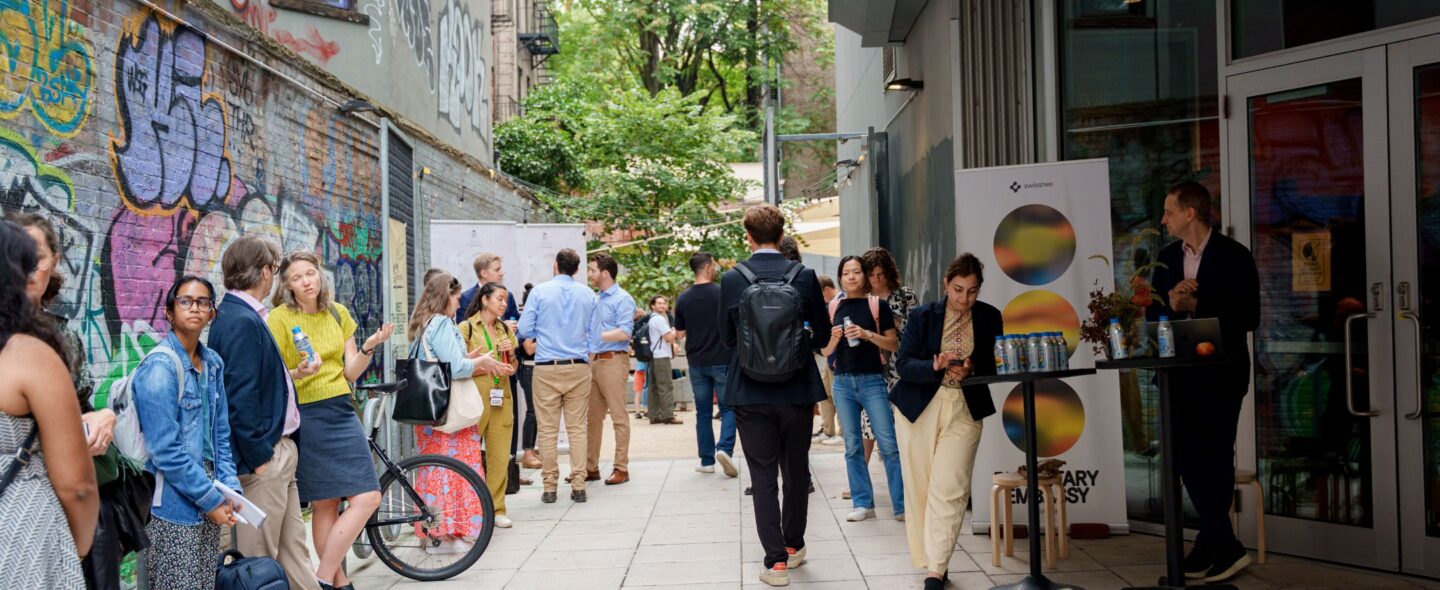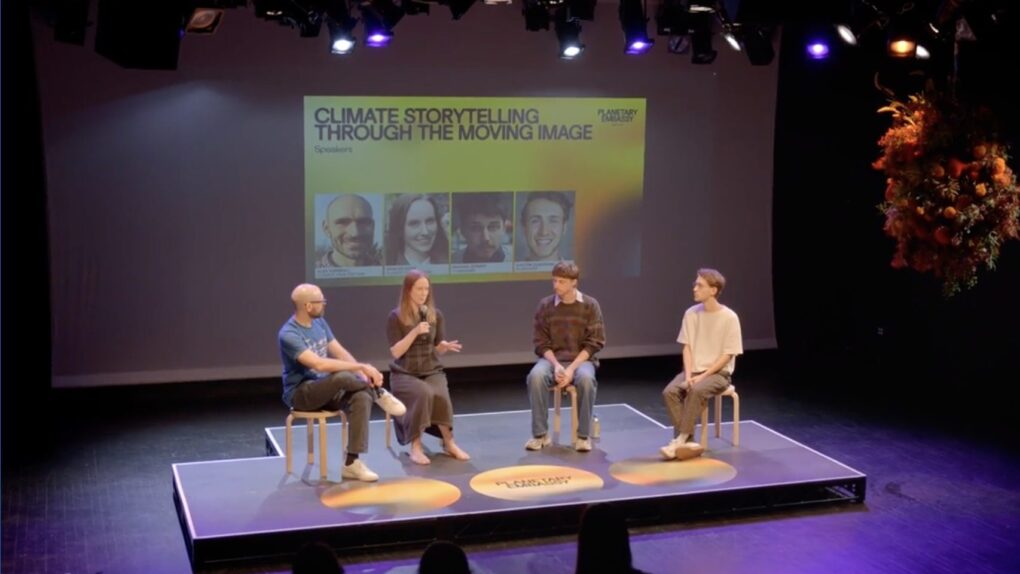
October 15, 2025 | New York
In late September, world leaders gathered in New York for the UN General Assembly High Level week. While heads of state and diplomats deliberated in Midtown, just down First Avenue, in the East Village, a stage was offered for the non-human voices on planet Earth.
From September 23 to 25, Swissnex transformed a theater in New York’s East Village into the world’s first Planetary Embassy, inviting attendees to imagine a new diplomatic paradigm – a “planetary diplomacy” that extends beyond the interests of nation states to include the more-than-human world. The centerpiece of Switzerland’s presence at Climate Week NYC, the Planetary Embassy hosted eight events and two installations incorporating insights from Indonesian coral reefs, Ukrainian soil ecosystems, a single Japanese pagoda tree in the Brooklyn Botanical Garden, and more.
“At its core, the Planetary Embassy asks how we might represent the interests of the more-than-human world — ecosystems and life forms who are rarely factored into governance and negotiation,” explained Philippe Roesle, CEO of Swissnex in Boston and New York. “What if the Amazon rainforest, the fauna of the Indian Ocean, or even the biogenic aerosols of the atmosphere participated in the global negotiations that shape our collective future?”
At the opening event, Imagining a Planetary Embassy, a panel addressed these questions from a range of perspectives—discussing the role indigenous cultures might play in hearing the natural world, how future generations can be educated to grasp non-human interests, and how science can help us rebalance our relationship with more-than-human entities. “I think that we need to remember that the earth is our mother,” said panelist Tecumseh Ceaser of the Metoac Indigenous Collective. “We call it ‘Kahèsëna Hàki’ in my language, which means ‘our mother earth,’ and that’s not excluding any animal or tree or human.”
These discussions continued throughout the week, with inputs from innovation, education, and the arts. During events on climate innovation and food circularity, Swiss startups participating in Climate Collider—a startup exchange program powered by Innosuisse and managed by Swissnex—demonstrated how technological innovation, from flood risk analysis tools to AI-driven food waste reduction, can help us adapt to changing planetary conditions and minimize our impact on the non-human world. Other events explored how innovative technologies can facilitate more-than-human collaborations. “I think the thing that I take away most from this event is this idea of radical collaboration, where people come together that might not be used to working with each other,” said Ulrike Pfreundt, co-founder of rrreefs, whose coral restoration work was showcased in a documentary screening and panel discussion. “What I like about the concept of a Planetary Embassy is trying to bring ecosystems to the table,” added Pfreundt. “We need a voice for the reefs at the table, we need a voice for the rainforest at the table, and if we could hear ecosystems and what they think they need, I think we could get a step further in this discussion.”
Artistic interventions and design-based approaches were front-and-center at the Planetary Embassy, including short film screenings and a masterclass on plant-based printing, as well as interactive installations. Urban Refuge, created and presented by students at the Institut auf dem Rosenberg in collaboration with MIT, allowed attendees to co-create prototypes for climate-responsive architecture and visions of resilient urban futures. Arboreal Severance, an immersive listening experience by Swiss artist duo Kieffer Woodtli, invited guests to experience the presence of nature through its absence.
“Art and design […] have the potential to really attune us in an ethical, embodied, sensory way to the more-than-human world around us,” said Rory O’Dea, Associate Professor of Art and Design at Parsons, who moderated a discussion on biodesign. “It’s that sense of deep engagement and active connection with the world that sets the foundation for all of the work that we need to do.”
The Planetary Embassy also highlighted youth action and education, with a majority of events featuring students or recent graduates. Among them were three award-winning design projects from the Zurich University of the Arts. CHORNOZEM, a project by Kirill Kohl, Oliva Menezes, and Yaroslava Shylyk to detect and remediate soil pollution caused by the war in Ukraine, won the 2025 Biodesign Challenge. The Planetary Embassy also showcased the short film Tschäggättä by Raphael Stäger, as well as a project on plant-based inks by Nicholas Wagner, both of which won the Swissnex-sponsored Punch Prize.
The program also featured reflections on the future of education itself. In Educating Planetary Stewards in the Age of AI, presented with the Villars Institute, speakers examined how learning can prepare new generations for planetary citizenship. During the discussion on food circularity, Gerardo Martinez, founder of the educational farm Wild Kid Acres, emphasized the importance of training tomorrow’s farmers in sustainable practices.
The pop-up at Climate Week NYC was the first in a series of Planetary Embassies across the global Swissnex network, which will continue in November at COP30 in Belem and in different locations around the world in the coming year.
-
![]()
Planetary Embassy: Highlights 2025
